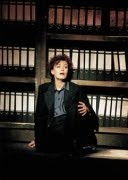Royal Albert Hall, Saturday 22 August 2009
(Concert Performance sung in German, with English narration written by Edward Said)
Leonore...........................Waltraud Meier soprano/narrator
Florestan...........................Simon O'Neill tenor
Don Pizarro......................Gerd Grochowski bass-baritone
Rocco..............................Sir John Tomlinson bass
Marzelline..........................Adriana Kucerova soprano
Jaquino........................... Stephan Rugamer tenor
Don Fernando....................Viktor Rud baritone
1st Prisoner.....................Andrew Murgatroyd tenor
2nd Prisoner......................Edward Price baritone
BBC Singers
Geoffrey Mitchell Choir
West-Eastern Divan Orchestra
Daniel Barenboim
This was a wonderful, inspiring performance; a triumph for Barenboim and the orchestra he founded. I was especially struck by the smooth legato playing of the strings during the overture, and the ringing trumpet calls from the gallery...Barenboim chose 'Leonore No,3'. (There had actually been a foretaste of the orchestra's abilities the previous evening, when they gave their first Proms concert, which included a splendid performance of the Prelude and Liebestod from Tristan und Isolde - Barenboim is of course renowned as a great Wagner interpreter).
The overture indicated that this was going to be a very exciting and memorable performance, and indeed it was. I liked the Marzelline (Adriana Kucerova), who had a bright, soubrette-like voice, but I wondered why she was the only one of the principals who sang from a score...Barenboim conducts without a score, and none of the others sang from a score. She has a perfect right to do this, of course, but it seemed a bit odd.
Sir John Tomlinson may not have been in perfect voice, but then perhaps the slightly hesitant, weary sounds he occasionally produced - rather different from the sonorous voice we are used to - were in character for the elderly, downtrodden Rocco.Gerd Grochowski (a last-minute replacement for Peter Mattei) coped well with the rather one-dimensional, Victorian melodrama-type role of Don Pizarro, making him sound convincingly and emphatically evil.
Yes..I'm coming to Waltraud Meier! But first I must commend Simon O'Neill's protrayal of Florestan, especially the ringing top notes of "Gott, welch' Dunkel hier!", which must be one of the most difficult tenor entrances ever written. The orchestra again reached heights of intensity in the prelude to Act II, indeed the tension they created had some of us literally on the edges of our seats.
Waltraud Meier gave a very intense, moving performance as Leonore. She combines beauty of tone with intensity of interpretation, this is a Leonore you can believe in and sympathise with. "Abscheulicher! Wo eilst du hin?" was very passionate, but what really almost brought tears to the eyes was the reunion with Florestan. (Oh namenlose Freude!)
(The image is of Meier in the Met production, as I couldn't find one of the Prom!)
Musically, then, a splendid evening. Many of the audience, however, (and people who listened to the broadcast, apparently) were less happy with the narration added by Edward Said to substitute for the spoken dialogue. It it written for Leonore (but was mostly pre-recorded by Waltraud Meier, although she recited some of the short passages live), and imagines her reflecting on the events long afterwards, asking whether the effort had really been worth it..."And yet....our victory was all too brief, and now I find it hard to grasp what happened, hard to accept or imagine that our idealism and faith left so few traces, lasted for so short a time".
This really puts a different perspective on the text, which doesn't really reflect Enlightenment thought. After the performance, which, not surprisingly, was cheered to the rafters, Barenboim made a short speech from the stage reminding everyone of the ideals for which the orchestra was founded...very moving speech.












No comments:
Post a Comment